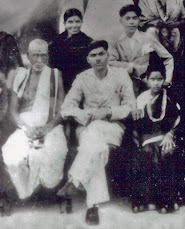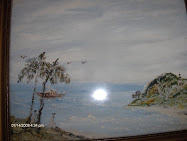After breakfast we set out for the compass in a bus. The bus was nearly full.
Swami Marzipan was there with his bare torso, leopard skin loincloth, beads around neck, sticking plaster on nose; cine camera and tape-recorder slung across the shoulders, haversack on his knees - a great baboon strayed from the herd.
Joan wrapped herself in a large bed cover, bare feet, baby face with a smile - a tigress with the head of wizened old woman peered quizzically out of her.
Ram and Domby were there and quite a few other brothers and sisters, too.
Swami Marzipan was talking to someone across the seat:
“Hello, professor, what are you up to here, today, I mean. I haven’t much to do, but I have to go I guess. I must have my shot of penicillin, you know, at the compass dispensary - price of biologism - ha, ha, bloody painful, too, and twenty more of them. We explorers of the spirit, the things we have to go through!”
The professor, a Swiss, we learnt, said, “I am here collecting material on the sociology of multi religious minglings - start a unit of fundamental research, you know - though I expect nothing much different from what we found in Dingo islands. Did you read my book, by the way?”
“No, professor, I am an honest guy - me, I don't read no books - only the ones I write. Happen to have a copy of my best-seller, the trilogy, ‘Naked Truth’. Only eight dollars, I have the set right here.” He thrust his hand into the haversack.
“Oh, I guess our library has it, thanks all the same. But you may like to keep a copy of my monograph on ‘Dingo totems, customs, and costumes, only five dollars?”
“No, no,” said Marzi, “I know all about the Dingo trinity - cost me hundred dollars, sixty injections and an year in bed, and nearly a knife in the back - ha, ha!”
A bearded Indian in dhoti joined in the talk, “But, excuse me, talking about books, begging your pardon, though I admire the two eminent works which have not yet reached me, and the time is not ripe yet, I fear, I am myself engaged in the humble task of writing, a book of all things, on “Religious universalism - its Indian origin,” wherein I propose to trace this compass here to times of Mohenjo Daro and beyond to the prevedic times of Bharat, you see but, you see, if you care to pay in advance on two copies, you will not regret it, since it will add enormously to your already valuable burdens and labours.”
Everyone looked out of the window as the gentleman tool out a receipt book.
Domby looked at everyone in turn, said, “Soham”, and closed his eyes.
The bus coughed to a halt half a mile from the main Compass.
We walked the half mile on relatively high ground. There before us lay the Compass - a large bowl of green earth - groups of bungalows lay clustered at the different points of the Compass - brown ribbons of road, like spokes of a wheel led to the centre - a big, domed circular building - a flag with a compass on it fluttered atop the building. Soon we met persons, notice boards, signposts, badged guides, cooking smells,and voices, notices and chantings in many tongues.
We were in the Compass.
Swami Marzipan was there with his bare torso, leopard skin loincloth, beads around neck, sticking plaster on nose; cine camera and tape-recorder slung across the shoulders, haversack on his knees - a great baboon strayed from the herd.
Joan wrapped herself in a large bed cover, bare feet, baby face with a smile - a tigress with the head of wizened old woman peered quizzically out of her.
Ram and Domby were there and quite a few other brothers and sisters, too.
Swami Marzipan was talking to someone across the seat:
“Hello, professor, what are you up to here, today, I mean. I haven’t much to do, but I have to go I guess. I must have my shot of penicillin, you know, at the compass dispensary - price of biologism - ha, ha, bloody painful, too, and twenty more of them. We explorers of the spirit, the things we have to go through!”
The professor, a Swiss, we learnt, said, “I am here collecting material on the sociology of multi religious minglings - start a unit of fundamental research, you know - though I expect nothing much different from what we found in Dingo islands. Did you read my book, by the way?”
“No, professor, I am an honest guy - me, I don't read no books - only the ones I write. Happen to have a copy of my best-seller, the trilogy, ‘Naked Truth’. Only eight dollars, I have the set right here.” He thrust his hand into the haversack.
“Oh, I guess our library has it, thanks all the same. But you may like to keep a copy of my monograph on ‘Dingo totems, customs, and costumes, only five dollars?”
“No, no,” said Marzi, “I know all about the Dingo trinity - cost me hundred dollars, sixty injections and an year in bed, and nearly a knife in the back - ha, ha!”
A bearded Indian in dhoti joined in the talk, “But, excuse me, talking about books, begging your pardon, though I admire the two eminent works which have not yet reached me, and the time is not ripe yet, I fear, I am myself engaged in the humble task of writing, a book of all things, on “Religious universalism - its Indian origin,” wherein I propose to trace this compass here to times of Mohenjo Daro and beyond to the prevedic times of Bharat, you see but, you see, if you care to pay in advance on two copies, you will not regret it, since it will add enormously to your already valuable burdens and labours.”
Everyone looked out of the window as the gentleman tool out a receipt book.
Domby looked at everyone in turn, said, “Soham”, and closed his eyes.
The bus coughed to a halt half a mile from the main Compass.
We walked the half mile on relatively high ground. There before us lay the Compass - a large bowl of green earth - groups of bungalows lay clustered at the different points of the Compass - brown ribbons of road, like spokes of a wheel led to the centre - a big, domed circular building - a flag with a compass on it fluttered atop the building. Soon we met persons, notice boards, signposts, badged guides, cooking smells,and voices, notices and chantings in many tongues.
We were in the Compass.











